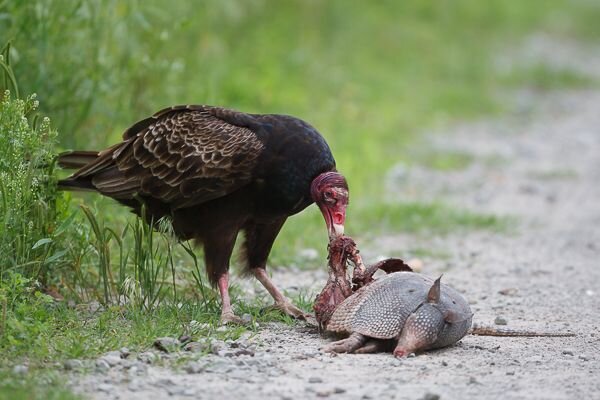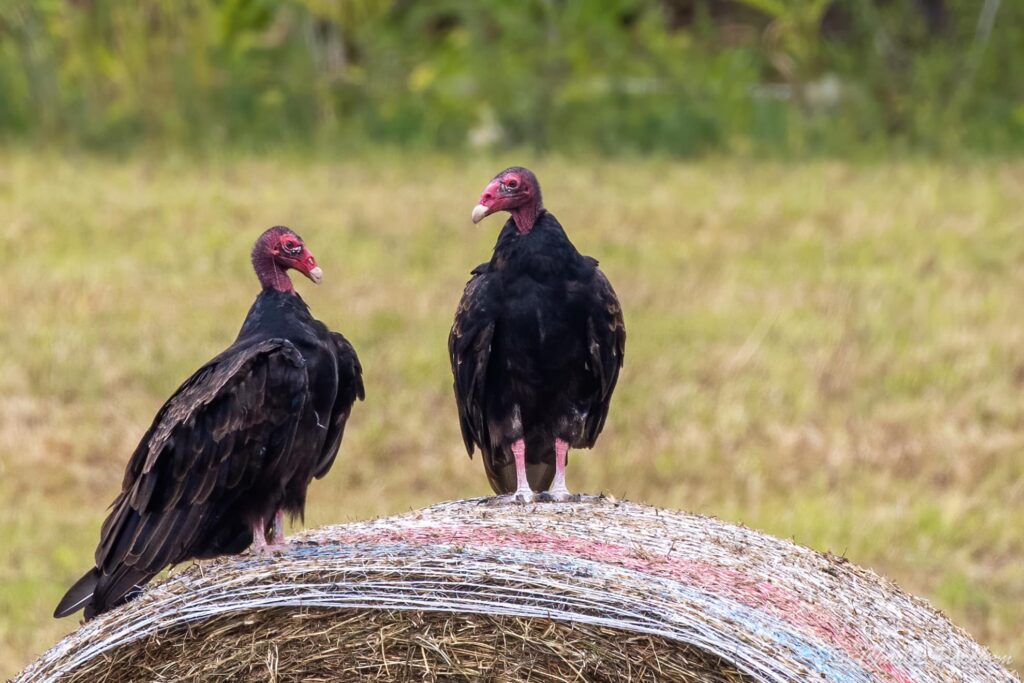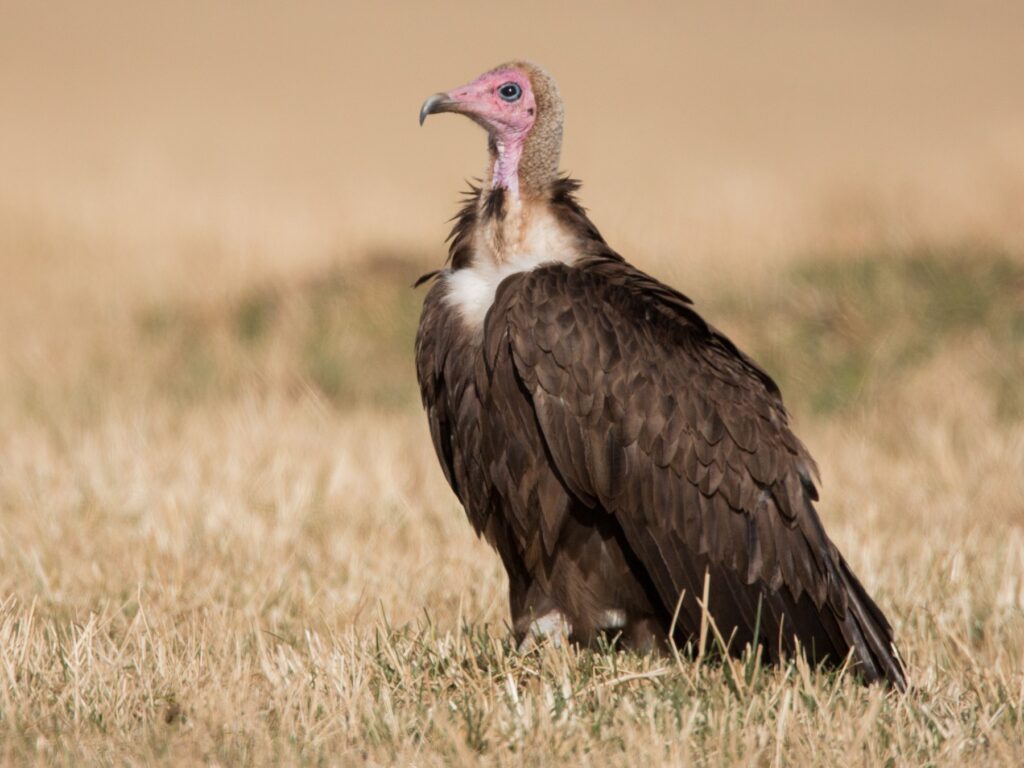Nature’s clean up Crew –The Vulnerable Vultures When one thinks about nature’s clean-up crew, the image of vultures often comes to mind. These magnificent birds play a crucial role in our ecosystem by feeding on carcasses, preventing the spread of disease, and maintaining the balance of nature. However, vulture populations have been rapidly declining in recent years, making their conservation a matter of great concern.
Vultures are scavengers that specialize in feeding on the carcasses of dead animals. Their unique adaptations make them highly efficient at this task. They have sharp beaks and powerful neck muscles that allow them to tear through tough hide and flesh. Additionally, vultures have a highly acidic stomach that enables them to digest and neutralize dangerous pathogens, such as anthrax and rabies, that may be present in decaying carcasses.

Without vultures, the remains of dead animals would accumulate, leading to an increase in diseases and the spread of pathogens. Vultures not only clean up the environment by disposing of carcasses, but they also protect other scavengers, such as rats and dogs, from consuming these potentially harmful remains. Their presence ensures a healthy and disease-free ecosystem.
Unfortunately, vultures are facing numerous threats that have resulted in a significant decline in their populations. One of the main culprits is the use of diclofenac, a veterinary painkiller that is toxic to vultures. When livestock are treated with diclofenac and subsequently die, vultures that feed on their carcasses suffer kidney failure and die. This widespread use of diclofenac has decimated vulture populations in many regions, particularly in South Asia.
Another threat to vultures is poisoning. Farmers often lace carcasses with toxic substances, such as pesticides or poisons intended to kill predators like wolves and jackals. Vultures feeding on these contaminated carcasses suffer the same fate, leading to a sharp decline in their numbers.
You can read our another post on Architecture of Odisha

Habitat loss is also a significant factor contributing to the vulnerability of vultures. Destruction of forests, conversion of wild lands for agriculture, and urbanization have all resulted in a loss of suitable nesting and roosting sites for vultures. As their habitats disappear, vultures cluster in smaller and fragmented areas, making them more susceptible to diseases and other threats.
Efforts to conserve vultures are crucial to maintain the ecological balance and prevent the potential repercussions of their decline. Several organizations and wildlife conservation groups are working together to improve the situation. One such initiative is the ban on the veterinary use of diclofenac in affected areas, which has shown positive results in some regions.
Additionally, captive breeding programs have been established to reintroduce vultures bred in captivity back into the wild. These programs aim to boost vulture populations and recover their numbers in areas where they have been severely impacted. Conservationists are also working on raising awareness among local communities about the importance of vultures and the need to protect them.

Furthermore, habitat restoration and the establishment of protected areas are vital for vultures to thrive. Preserving and conserving their natural habitats ensures that vultures have safe nesting and roosting sites, and ample food supply.
As individuals, we can contribute to the conservation of vultures by supporting local conservation organizations, spreading awareness about their plight, and advocating for stricter regulations on the use of harmful veterinary drugs. Additionally, we can make efforts to reduce our ecological footprint by using environmentally-friendly products and supporting sustainable agriculture.
The conservation of vultures is not only essential for the well-being of our ecosystem but also for maintaining public health and hygiene. These birds are nature’s true clean-up crew, and their survival is crucial for a balanced and healthy environment. By protecting and supporting vultures, we are taking a significant step towards the conservation of our natural world.

Write A FAQ For Nature’s clean up Crew –The Vulnerable Vultures
Why are vultures considered a part of nature’s clean-up crew?
Vultures are known as nature’s clean-up crew because they play a vital role in scavenging and disposing of animal carcasses. They are specially adapted to feed on decaying flesh and consuming carrion that may otherwise pose a risk to the environment and human health.
How do vultures help maintain ecosystem balance?
Vultures help maintain ecosystem balance by removing animal carcasses quickly and efficiently. This prevents the spread of diseases that may arise from rotting carcasses, reducing the risk of contamination and keeping the environment clean. Additionally, vultures prevent the accumulation of dead animals, which can attract other scavengers and disrupt the ecological balance.
What are the main threats facing vultures?
Vultures face numerous threats, including habitat loss, poisoning, illegal wildlife trade, and depletion of their primary food source due to overhunting or poaching. They are also highly vulnerable to accidental or intentional poisoning from consuming carcasses that have been laced with toxic substances, such as pesticides or veterinary drugs.
How does the decline in vulture populations affect the environment and other species?
The decline in vulture populations has significant ecological and environmental consequences. Without vultures to efficiently dispose of carcasses, there is an increased risk of disease transmission, as rotting carcasses attract other scavengers and potential disease vectors. This can lead to the spread of diseases among animals and even humans. Furthermore, the decline in vultures disrupts the natural food chain, impacting other species that rely on the availability of carrion for their survival.
Are there any conservation efforts targeting vultures?
Yes, there are various conservation efforts aimed at protecting and conserving vultures. These include establishing protected areas and conservation zones, implementing anti-poaching measures, advocating for stricter regulations on the use of toxic substances, and raising awareness about the important role vultures play in the ecosystem. Additionally, captive breeding programs and rehabilitation centers are being established to rehabilitate injured or sick vultures and release them back into the wild to help restore their populations.
